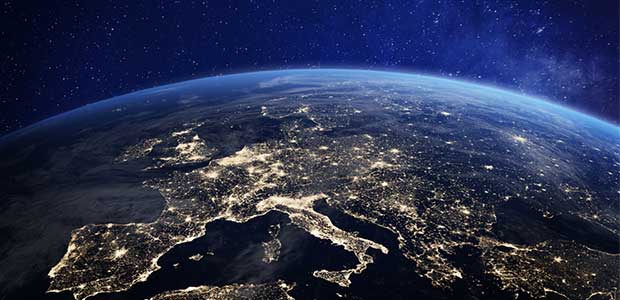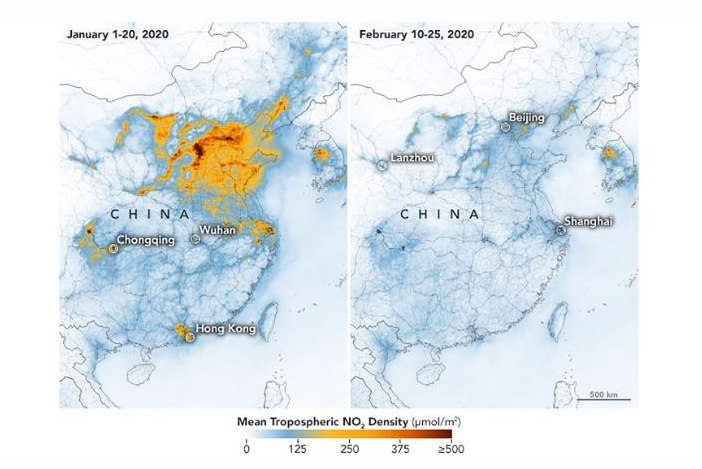
COVID-19 and Climate Change: The Unexpected Pairing
The worldwide pandemic has had some unexpected effects on climate change. The question is: can the world learn from it?
The coronavirus has incited a lot of change across the world these last couple months. Entire cities have shut down, trains and airfare have all but nearly stopped, public spaces are shut down, concerts cancelled, ski resorts closed. Much of life has come to a stop—as have much of the world’s output of greenhouse gases.
If there’s something good to come from this worldwide pandemic, it might be the way Earth is given a chance to breathe a bit. Scientists have already seen how quickly the climate, and nature far and wide, is already revitalizing and recovering from human climate change damage.
One New York Times article draws a pretty clear connection between the growing coronavirus pandemic and world climate change: both require “early, aggressive action to minimize loss,” said Kim Cobb, a climate scientist at the Georgia Institute of Technology.
Scientists like Dr. Cobb have urged world leaders to act aggressively and quickly to curve planet-warming emissions. Still, emissions have only grown, and the Earth reacted: a three-month-long flood in the Florida Keys, wildfires across Australia, and deadly heat waves in Europe to name a few.
The article goes into the idea that humans, by nature, have a hard time thinking about the future. The psychological part that goes into thinking about tomorrow is not easy for us, and climate science—which deals with future probabilities—is “hard to process and hard for us to be afraid of.”
Both the coronavirus and climate change are problems of the here and now, both have the potential to take human lives, and both have even graver consequences in the foreseeable future. Yet, there’s one major difference in human psychology: humans have a hard time considering climate projections for 20 or 30 years down the road, but being quarantined for the next week is a stark and scary reality.
As scientists warn that rising temperatures will lead to catastrophic results, extreme disasters and droughts, those warnings do little to spark policy change. However, with COVID-19, we are told to not leave our homes, not fly, and cough into our elbows.
While humans are routinely bad about acting against climate change—and somewhat bad about controlling a worldwide pandemic outbreak—one CNN article notes an unintended benefit of all this: the virus has already had positive effects on the Earth and climate change.
In China, factories were shuttered and streets were cleared to stop the spread of the virus. People slowed down, stayed home, and most things came to a halt—and the skies cleared.
The average number of “good quality air days” increased 21.5 percent in February, compared to the same period last year, according to China’s Ministry of Ecology and Environment.
In fact, satellite images released by NASA and the European Space Agency show a dramatic reduction in nitrogen dioxide emissions—those released by vehicles, power plants and industrial facilities—in major Chinese cities between January and February. The cloud of toxic gas that was once very visible above industrial powerhouses had nearly disappeared.
“This is the first time I have seen such a dramatic drop-off over such a wide area for a specific event,” says Fei Liu, an air quality researcher at NASA's Goddard Space Flight Center. “I am not surprised because many cities nationwide have taken measures to minimize the spread of the virus.”

Even between February 3 to March 1, carbon dioxide emissions were down at least 25 percent because of the measures to contain the virus, according to the Center for Research on Energy and Clean Air (CREA), an air pollution research organization.
When you consider China as the world’s biggest polluter, this data is quite notable. China contributes 30 percent of the world’s carbon dioxide emissions annually—so the “impact of this kind of drop is huge, even over a short period,” says the article. The CREA estimates this 30 percent is nearly 200 million tons of carbon dioxide—more than half the entire annual emissions output of the UK.
This kind of drop in emissions has not been isolated to just China, however. While Italy—like China—has an unfortunately high number of coronavirus cases, its output of greenhouse gases has notable dropped since the entire country has been essentially on lockdown.
One NBC News article said Venice’s usually murky canal waters began to get clearer, with fish visible in the water below. NASA admits that similar emissions reductions are notable from space above other countries too—not just China. One analysis by the Washington Post found that the most dramatic emissions drop was observed over northern Italy.
Major U.S. cities have show similar reactions to the virus as more and more communities go into shelter-in place orders and follow social distancing. New York, San Francisco and Seattle are among those hit hardest by the virus and those that tend to be big gas emitters. Jordan Wildish, a project director at Earth Economics, an environmental non-profit organization based in Tacoma, Washington, developed an online dashboard to track air quality in the tree cities—comparing the measurements with figures from the same time last year.
In just five days, San Francisco saw a 40 percent decrease in particulate matter levels compared to last year’s levels at this time—a result of the city’s shelter-in-place order to control the virus. New York City saw a 28 percent drop over the same period of time, and Seattle saw a 32 percent decrease.
These numbers are notable—and somewhat encouraging. Just look at what a couple days of intense change could do for our environment!
But experts warn that observed reductions are temporary and that cities, countries and economies bounce back, so will emissions—unless major infrastructure or societal changes are adopted. In fact, some think a kind of backlash might happen once things get up and running again.
According to CNN, once the Chinese society and government adjusts back to “normal,” the country will likely try to make up for lost profit, and there may be a very ramped up reaction to the hiatus.
“The reduction in air pollution has been very clear so if the pollution does come back, because of stimulus measures, because of heavy industry going into overdrive to make up for lost time, there could be a counter reaction,” said a lead analyst at CREA.
As the world reacts, adapts and learns from the global pandemic, communities will have a lot to learn from these past few months. If anything, this time has shown the very direct affect we have on climate change and global warming. Will we remember it when this pandemic is over?